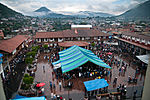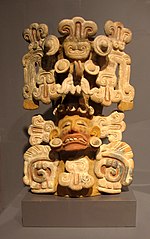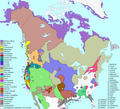 | comes from a Purépecha background. Pirekua Pelota purépecha Purépecha deities Purépecha Empire Purépecha language Purépecha flag "Purépecha". 26 December... 17 KB (2,071 words) - 23:57, 9 March 2024 |
 | the Purépecha Empire, Michhuahcān from michin ("fish"), -huah ("possessor of"), and -cān ("place of") and means "place of fishers." The Purépecha Empire... 23 KB (2,397 words) - 03:52, 22 April 2024 |
Tarascan (redirect from Tarasco language) 1500s, located in (present-day) west-central Mexico the Purépecha people the Purépecha language The term has pejorative connotations of "loathsomeness... 1 KB (136 words) - 23:55, 28 January 2024 |
Purépecha are an indigenous people of the Mexican state of Michoacán. Purépecha may also refer to: Purépecha language, the language of the Purépecha Purépecha... 371 bytes (78 words) - 02:11, 10 January 2019 |
 | Michoacán (category Articles containing Western Highland Purepecha-language text) and Teco peoples as well as the Purépecha. The main pre-Hispanic civilization of the state is that of the Purépecha, which was centered in the Lake Pátzcuaro... 92 KB (8,887 words) - 04:56, 22 April 2024 |
 | Zihuatanejo (category CS1 Spanish-language sources (es)) Zihuatanejo has two possible origins. One origin might be from the Purépecha language meaning "water of the yellow mountain"; another possible origin might... 50 KB (5,754 words) - 04:19, 1 February 2024 |
The culture of the Purépecha people was polytheist. List of some deities: Curicaveri - Sun god Cuerauáperi - Creation goddess Xarátanga - Water god Cuitzeo... 3 KB (56 words) - 13:22, 7 February 2024 |
 | The Purépecha flag is the official flag of the Purépecha people, an Indigenous nation in Michoacán, Mexico. This flag consists of four fields of four colors... 2 KB (250 words) - 20:54, 30 March 2024 |
 | also take place in modern arenas. The word Jaripeo derived from the Purépecha language in the Mexican state of Michoacán comes from Xarhipeo, the name of... 4 KB (496 words) - 20:22, 28 February 2024 |
 | Cherán (category Purépecha) eleven Municipios that are demographically denoted as Purépecha. Inhabitants speak the Purépecha language, as well as the local variety of Spanish. Cherán... 18 KB (1,790 words) - 17:24, 20 March 2024 |
languages Yana/Yahi and other Hokan languages Mayan languages Totonacan languages Mixe-Zoquean languages Purépecha language Tequistlatecan languages Huave... 36 KB (4,679 words) - 18:47, 9 November 2023 |
 | Parícutin (category CS1 Spanish-language sources (es)) volcano is divided into four stages, with names that come from the Purépecha language. The first phase (Quitzocho) extended from February 22 to October... 23 KB (2,827 words) - 13:26, 22 March 2024 |
 | the first distillery was built in the region. Charanda is a term in Purépecha language meaning 'red-colored soil'. Obtained through the distillation and... 3 KB (297 words) - 01:50, 6 June 2022 |
 | Tzintzuntzan (Mesoamerican site) (category Purépecha sites) ceremonial center of the pre-Columbian Purépecha capital of the same name. The name comes from the Purépecha word Ts’intsuntsani, which means "place... 24 KB (3,120 words) - 20:47, 23 March 2024 |
 | The Purépecha religion is the religion of the Purépecha people. "The Purepecha of Michoacan - Purepecha - Mexico Guru". www.mexicoguru.com. Retrieved... 1 KB (39 words) - 03:03, 23 January 2024 |
 | languages, the Paezan languages and the Tucanoan languages. Macro-Quechua comprising the Zuni language, the Purépecha language and various languages of... 89 KB (2,421 words) - 13:03, 29 January 2024 |
El Opeño (category CS1 Spanish-language sources (es)) hill facing Jacona, for example, is called Curutarán. Curutarán is a Purépecha language word, formed by the words: "ku", put together; "rhu", projection,... 13 KB (1,610 words) - 18:37, 20 July 2023 |
 | Sinaloa (category CS1 Spanish-language sources (es)) Héctor R. Olea combinsa Cahia sina with the locative "ro" from the Purépecha language and "a" from Aztec atl ('water'), thus "place of pithayas in the water... 41 KB (3,204 words) - 09:06, 20 April 2024 |
 | Lila Downs (category Purépecha-language singers) and has recorded songs in many indigenous languages such as Mixtec, Zapotec, Mayan, Nahuatl and Purépecha. Born and raised in Oaxaca, she primarily studied... 48 KB (5,603 words) - 04:23, 13 April 2024 |
 | Zamora, Michoacán (category CS1 Spanish-language sources (es)) Nahua, Huetamo, Colima, and Purépecha. Zamora sits in the Tziróndaro Valley which means "swamp place" in the Purépecha language. The village of Zamora was... 19 KB (1,648 words) - 20:06, 15 April 2024 |
 | Guanajuato (category Articles containing Western Highland Purepecha-language text) the Aztec Empire or Purépecha Empire, but Guanajuato was under the control of neither. It was on the northern border of the Purépecha Empire with southern... 120 KB (13,661 words) - 13:45, 19 April 2024 |
 | Guanajuato (city) (category Articles containing Western Highland Purepecha-language text) were the Otomi, who were then displaced by the Chichimeca. There was Purépecha presence as well due mostly to ancient trading routes. The oldest known... 82 KB (9,583 words) - 07:43, 27 February 2024 |
 | Ihuatzio (archaeological site) (category Purépecha sites) Michoacán. In Purépecha, language of the Purépecha, the name of the state was Iréchecua Tzintzuntzáni, the "lands of Tzintzuntzan". The Purépecha were a nomadic... 44 KB (5,434 words) - 09:27, 4 June 2023 |
 | Chupícuaro (category CS1 Spanish-language sources (es)) Chupícuaro can be translated as blue place. The name derives from the Purépecha language word "chupicua", a name for the "Ipomoea" plant, used for blue dye... 17 KB (1,945 words) - 20:21, 10 September 2023 |






